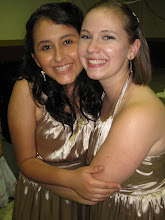That's the title of my favorite chapter in Donald Miller's book Blue Like Jazz. I'm sure everyone and their dog has heard of this book, but bare with me, because today has suddenly become an ok day after I re-read this chapter, and I want to share this goodness with you.
I've been feeling in a bit of a daze since I've been in California. I don't really know how to explain it other than to say in a daze. I know I've used the example of being in a fog before, but it wasn't even like that. I just kind of felt like I'm trying to figure out how I "fit" here, and how I'm liked or whatever here (I hate that I even spend so much time on how I'm liked, but it's more like trying to figure out who actually likes me for who I am and not caving under the pressure to be whatever I think would be more likable).
I feel like in the midst of everything I've been trying to figure out and adjust to in being here, I've forgotten who I am and what the calling on my life has and always will be, no matter what environment/culture/people I find myself in. I am to love God, and love others. I feel like this truth has just been kind of stifled in my life since I came here to California. I don't really know why, it just kind of has. I guess I've been so caught up in trying to figure out how I fit, that I've forgotten what the main point actually is. It's not about me. It's about loving God and loving others.
I can't say I owe this entirely to my re-reading of Blue Like Jazz, because for one, I specifically looked up the chapter on love because I knew I needed to be reminded of something. I can recognize that all of this central-focused attitude has left me feeling inferior, unlikable, and pretty dumb. I also recognize that if I can switch up my focus from why I am not receiving the affirmation I am seeking from people here, and instead focus everything on my affirmation coming from Christ, then pouring out that fullness of His love to all around me regardless of how I am treated or seen, I will see myself and others as Christ sees us all.
Here's a snipet of the chapter that I love so much:
"Mr. Spencer [a professor at Westmont] then asked us about another area in which he felt metaphors cause trouble. He asked us to consider relationships. What metaphors do we use when we think of relationships? We value people, I shouted out. We invest in people, another person added. And soon enough we had listed an entire white board of economic metaphor. Relationships could be bankrupt, we said. People are priceless, we said. All economic metaphor. I was taken aback.
"And that's when it hit me like so much epiphany getting dislodged from my arteries. The problem with Christian culture is we think of love as a commodity. We use it like money. . . I could see it very clearly. If somebody is doing something for us, offering us something, be it gifts, time, popularity, or what have you, we feel they have value, we feel they are worth something to us, and, perhaps, we feel they are priceless. . . I used love like money, but love doesn't work like money. It is not a commodity. When we barter with it, we all lose. When the church does not love its enemies, it fuels their rage. It makes them hate us more.
". . . I replaced economic metaphor, in my mind, with something different, a free gift metaphor or a magnet metaphor. That is, instead of withholding love to change somebody, I poured it on, lavishly. I hoped that love would work like a magnet, pulling people away from the mire and toward healing. I knew this was the way God loved me. God had never withheld love to teach me a lesson. "
I want to love in such a way that I recognize it as needing to be lavished upon everyone. I want it to just pour out of every area of my life, and I never want to withhold love because I think someone needs to "learn something" from it. That's not my job, and it never will be. I hope this never becomes lost in the daze again. I pray it won't.
Subscribe to:
Post Comments (Atom)







1 comment:
Amen, sister
Post a Comment